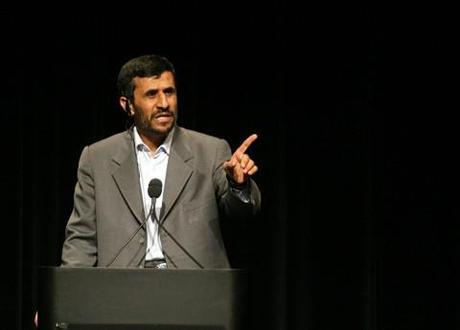
Mahmoud Ahmadinejag, the President of Iran. Photocredit:Fotopedia
Mostafa Ahmadi Roshan, the supervisor of a department in Iran’s main uranium enrichment site, has been killed by a magnetic bomb attached to his car. It’s at least the fourth death of a nuclear scientist in Iran in two years, and also part of a “long line of suspicious setbacks” to the country’s nuclear program, including “kidnappings, sabotaged equipment, computer viruses … and mysterious explosions,” reported The National Post.
In the capital, Tehran, there is anger against Israel and the United States, which it is blaming for the attack. Newspapers are even calling for retaliation against Israel, and assassinations of Israeli military officials. Tehran has called for the United Nations to condemn the attack, and the US and Iran have both denied any involvement. Whilst both countries think that Iran’s building nuclear weapons, it claims that its ambitions are peaceful. Iran has announced that it’s starting a second uranium-enrichment plant near Qom – in defiance of the United Nations, and in a heavily fortified facility.
Does this ramp up the tensions between US and Iran? Is the possibility of nuclear war ever closer?
“I have no idea who targeted the Iranian scientist but I certainly don’t shed a tear,” wrote Brigadier General Yoav Mordechai, a spokesman for the Israeli Defence force, on his Facebook page, quoted on CNN.com
“This cowardly [act of] terror, whose perpetrators and plotters will never dare to confess to their dirty and hideous crime or accept responsibility for it, has been carried out by the planning or support of CIA and Mossad services, like all other crimes of the network of international state terrorism,” Ayatollah Khamenei quoted on Haaretz
Who’s behind it? Michael Rubin, a scholar at the American Enterprise Institute, says that Israel is the most plausible source of the attacks; Trita Parsi, president of the National Iranian-American Council, said he didn’t think that the killings were done by the US. , both quoted on CNN.
Whoever it is, they know what they’re doing. It all points to “a systematic approach and professsionalism,” said Amir Oren on Haaretz. This campaign is “not a war of choice” – without it, “tensions in the Middle East would intensify to an inolerable level.” Whoever’s behind the assassinations “will not be reconciled to a militarily nuclear Iran.” They also “understand that any system that is damaged or even destroyed can be rehabilitated if the right people are found to revivie it.
But isn’t it just terrorism? Andrew Sullivan on The Daily Beast posited that murdering civilians in another country is simply terrorism. What would happen if someone started killing American scientists, on American soil? We can’t condemn terrorism if we’re effectively condoning it.
There are dire consequences. Julian Borger in The Sydney Morning Herald said that the assassination’s methods were “all too familiar.” Tensions are about to rise yet further between Iran and the US over the Strait of Hormuz, which Iran is threatening to close, thus stopping the flow of oil. There’s about to be an EU oil embargo, too; the US is targeting the Iranian oil trade, too – whihc could be seen as a “declaration of war.” This scientist’s death has “all the potential of a struck match at an explosives dump.” A covert war may be “a better alternative”, as it will deter young Iranians from working in nuclear science. But whoever’s doing it is “clearly willing to risk catatrosphic consequences that could engulf the region.”
Don’t work in nuclear physics. Physics is certainly “an unhealthy line of work” for Iranians, said Michael Burleigh in The Daily Telegraph. Knowing who did is “inherenly unknowable,” though Mossad is a likely gues. Israel has “historical form in this area.” Although there are “questions about the morality of killing such men,” there are also questions about “the morality of their work in the first place.” Iranian scientists are working for a regime that has threatened Israel with a nuclear weapon. Burleigh won’t be shedding “any tears” over these murders.”
War is unlikely. President Ahmadinejad’s “propaganda machine” has been “ratcheting up the talk of war,” said Robert Fox in The Week. But, American officials say that force should be avoided “at all costs” – “though the military option shouldn’t be taken off the table altogether.” Sanctions are “taking their toll”; and protests against Ahmadinejad’s regime haven’t gone away. “Washington seems intent on confrontation and not outright conflict. But in those narrow waters, the line between rhetoric and action is too easily crossed.”

